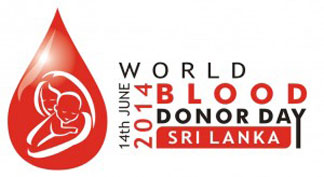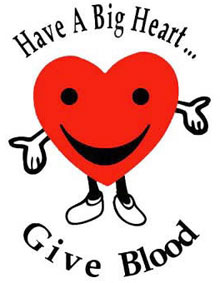|
World Blood Donor Day:
Sri Lanka makes giant strides in transfusion
by Manjula Fernando
 Sri Lanka being selected by the World Health Organisation to host the
11th global event of World Blood Donor Day this year is a monumental
achievement that will honor the success story of Sri Lanka's National
Blood Transfusion Service (NBTS) which has evolved from a single room to
a vast network . Sri Lanka being selected by the World Health Organisation to host the
11th global event of World Blood Donor Day this year is a monumental
achievement that will honor the success story of Sri Lanka's National
Blood Transfusion Service (NBTS) which has evolved from a single room to
a vast network .
Blood donation in Sri Lanka was known following an appeal for blood
to save the life of former prime minister S.W.R.D.Bandaranaike who was
shot by a mindless gunman in 1959. The blood bank then was a single room
located near the surgical unit of the National Hospital Colombo, known
at the time as the Colombo General Hospital. Today it has grown into a
centrally coordinated transfusion service with nearly 100 hospital based
blood banks.
Head of Quality Management Section, National Blood Centre, Dr.Kumudu
Sri Kuruppu said WHO considers Sri Lanka as one of the model developing
countries in the Asian region which has achieved vast strides in the
area of blood transfusion.
“WHO promotes its member countries to have a safe blood collection
system based on a 100% voluntary donors.”
In most of the countries, including the West the patients’ relatives
are compelled to donate blood when ever required. By 2012 about 99.4 %
of the blood collections in Sri Lanka were from voluntary donors. In
2013 this has reached the 100% mark.
WHO's goal is for all countries to obtain their blood from voluntary
unpaid donors by 2020. According to WHO statistics, by 2014, 60
countries have their national blood supplies based on 99-100% voluntary
unpaid donations.
There is however, 73 countries yet to come on board. Blood
transfusion can help patients suffering from life threatening conditions
live longer and with higher quality of life. It also supports complex
medical and surgical procedures as well as safe childbirth.
The reason to promote voluntary donor collection is to minimise the
spread of infectious diseases such as HIV due to coerced donations such
as forcing the relatives to donate blood when a person is undergoing
surgery. It has been found world over that voluntary donors are the
safest donors compared to those who donate blood involuntarily.
Among the intense screening techniques used in Sri Lanka to enhance
safety, are screening of donors, exclusion of high risk donors, testing
donated blood for five infectious diseases - HIV, Hepatitis B, Hepatitis
C, Malaria and Syphilis before releasing blood for transfusion.
In addition Sri Lanka has achieved most of the WHO recommended
strategies for safe blood collection, testing, blood grouping, storage
and transfusion. “In some areas we have equated best practices of
certain developed countries.”
To uplift Sri Lanka's ranking further, an on going project aspires to
introduce the latest technology in blood banking, for instance state of
the art technology such as cord blood banking, molecular based HLA
testing, NAT testing to provide an extra layer of protection for
transfusion-transmissible-infections and introduction of frozen red cell
facility. These were all instrumental for Sri Lanka to achieve the “host
nation” status.
 Dr. Kuruppu said throughout the years the National Blood Transfusion
Service has managed to keep a steady supply of blood for state and
private sector hospitals and annually around 5000 blood donation camps
are organised island wide. “In 2012 we collected about 350,000 such
units and in 2013 this number grew up to 380,000.” Dr. Kuruppu said throughout the years the National Blood Transfusion
Service has managed to keep a steady supply of blood for state and
private sector hospitals and annually around 5000 blood donation camps
are organised island wide. “In 2012 we collected about 350,000 such
units and in 2013 this number grew up to 380,000.”
The National Blood Center maintains a registry of regular donors and
a databank of donors of rare blood groups which constitute about 5% of
the total number of registered donors.
The registry of donors is currently maintained manually. An on going
project aims to computerise the entire database in the coming weeks. It
envisages to computerise the (NBTS) network donor registry linking the
data-banks in the entire network of peripheral blood banks. National
Blood Center (NBC) was established in 2006 at the present premises
in Narahenpita under a Japan Bank for International Corporation (JBIC)
project.
The project guided by WHO consultants provided modern blood banking
equipment to the National Centre and also for five other selected blood
centers across the country.
The standard and quality of the services of the National Blood Centre
have been improved with many national and international awards
including, the National Health Excellence Awards 2009-2010, Taiki
Akimoto 5S Awards 2010, National Green Awards 2011, National Quality
Awards 2011 and ISBT Award for Developing Countries in 2012 . It has
also become the first ever government health sector organization to get
ISO accreditation for medical laboratories.
****************
[Tribute to donors]
The World Blood Donor Day pronounced by WHO is an internationally
celebrated event to pay tribute to the voluntary blood donors. It takes
place on June 14 every year.
Since 2004 WHO selects a country to host the world event on the basis
of the achievements and quality of the transfusion service. Previously
South Africa, UK, Thailand, Canada, Dubai, Australia, Spain, Argentina
and France have hosted the event.
During the 2013 WBDD global event held at Paris- France, it was
officially proclaimed that WHO has selected Sri Lanka to host the WBDD
global event in 2014 under the theme ‘Safe Blood for Saving Mothers'.
“With just 37 maternal deaths per 100,000 births, Sri Lanka leads the
region (240 deaths per 100,000 births) in maternal mortality hence the
theme perfectly fits us,” Dr.Kuruppu said.
The government has declared a World Blood Donor week from June 4 to
14. The events lined up are,
-Vehicle parades already commenced on the 4th from Jaffna, Batticaloa,
Trincomalee and Hambantota to reach the BMICH where the main event will
be held, on June 14.
-Scientific sessions to be attended by 300 local and international
experts on blood transfusion and maternal care from June 9 to 10. -A
mass blood donation camp at the BMICH on June 12.
-International symposium on ‘Reducing Maternal Mortality through
improved service delivery and safety for obstetric care: role of blood
transfusion’ at National Blood Centre on June 13.
-Main event under the patronage of President Mahinda Rajapaksa is
scheduled on June 14 at the BMICH. The program include donor
felicitation, issuance of a commemorative stamp and a poster competition
as well as the handing over of WBDD flag to the next host country.
**************** |

